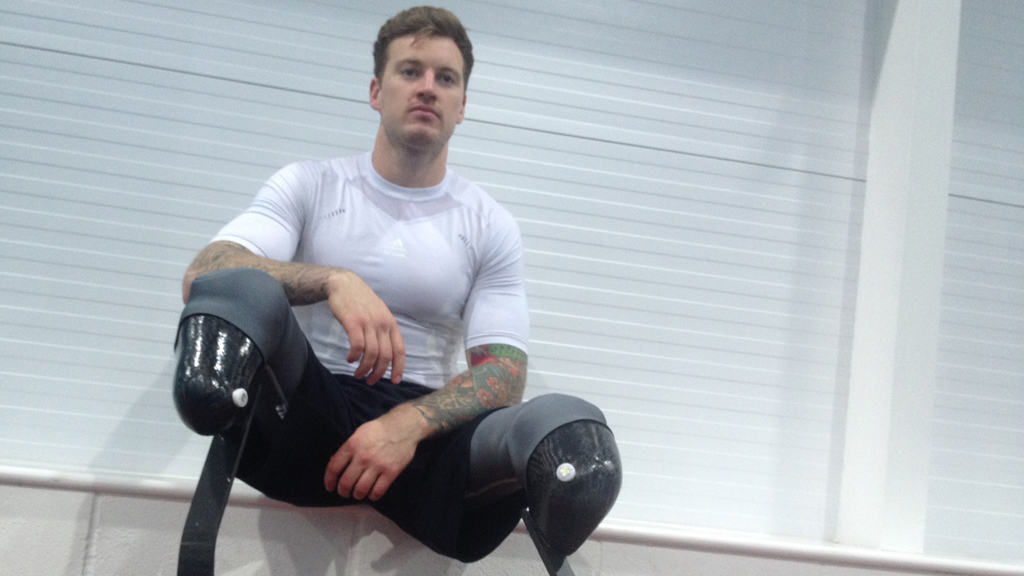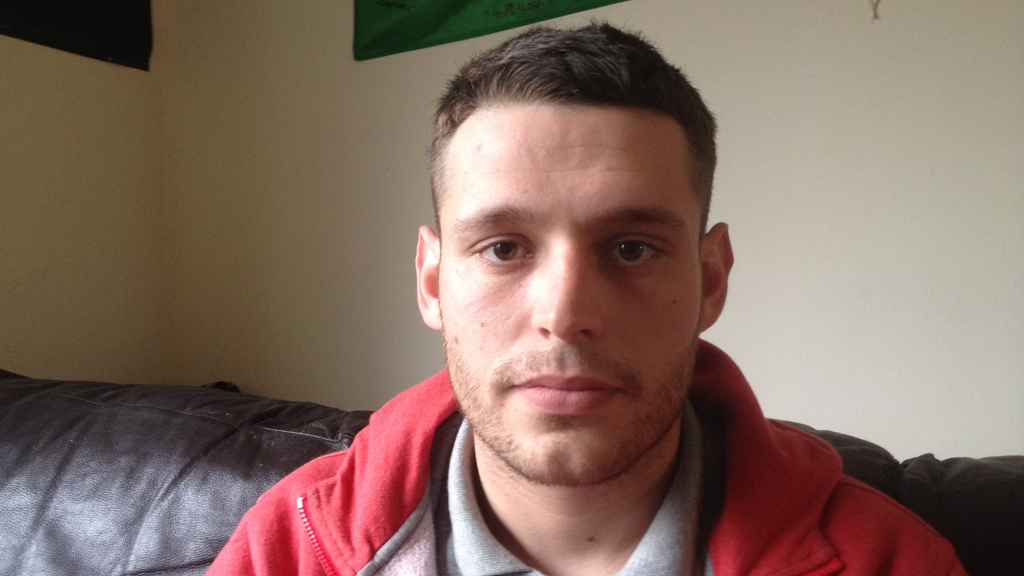Afghan veteran: ‘I feel lucky in a way sometimes’
 Andy Davies
Home Affairs Correspondent
Andy Davies
Home Affairs Correspondent
Two young men from Cardiff who both served with the British Army in Afghanistan tell their very different stories of return and recuperation.
“Lucky” perhaps isn’t the way you’d expect a man who’d lost both of his legs in Afghanistan to describe himself.
But less than two years since the explosion which seriously injured former Fusilier Stephen Handley, he says his life has been changed for the better.

“It’s made me a lot more relaxed in a way, which is funny because a lot of people expect you to be aggressive and a bit sort of messed up from Afghan, but I think I’m acutally a lot more of a chilled out guy.
“I don’t sweat the small stuff anymore…it’s shaken my life up so much and opened doors… I feel lucky in a way sometimes”.
Blast injuries
I met the 25-year-old as he trained at Cardiff’s National Indoor Athletics Centre, which that morning was also playing host to hundreds of school pupils on a sports day. As Stephen walked across the track, a child whispered to a friend: “look at those blades”.
The blades are one of five pairs of prosthetic legs he owns, each specifically designed for running.
Athletics – and the dream of competing in the Rio Paralympics – are now a central part of his life, a world away from the day in May 2012 when he stood on an improvised explosive device (IED) while on patrol in Afghanistan. He was on his second tour in the country with 1st Battalion Royal Welsh.
The blast threw him so high he could see the tops of the trees he’d been walking alongside.
“I first realised I stepped on one because it happened so quick I was kind of, er, up in the air looking at the top of the trees which were along the line of where we were walking.
“The weird thing was my shoulder was hurting first because I landed on my shoulder and that hurt and then the pain kicked in… my left leg was by my head on my right hand side, and my right was attached to me still but it was pretty much just hanging on by some skin.”
As his colleagues and a medic carried him away, a second device exploded, throwing him from the stretcher.

Paralympic ambitions
His recovery by any standard was remarkably fast. Even during months spent first in hospital and then at the Headley Court rehabilitation centre where he learned to walk and run again, he was already contemplating a future as a Paralympic athlete.
His athletic potential was spotted at a talent day, since when he’s found a coach and manager and even set up a business as a personal trainer.
Stephen has received compensation for his injuries. Soon he’ll receive a military pension too: he only left the army last week.
He has nothing but praise for the support and rehabilitation services he was provided with, and credits them with his rapid physical recovery. He is one of more than 275 British personnel who lost limbs while serving in Afghanistan.
Post traumatic stress
But alongside the brutal legacy of amputations which the war there has left in its wake is another, less visible consequence.
More than 1,300 Afghan veterans have been diagnosed with Post Traumatic Stress Disorder, or PTSD, since 2007.

Three miles across Cardiff, I met a fellow former soldier who served in the same regiment as Stephen Handley.
He’s living in temporary accommodation, struggling to make ends meet on sickness benefit, and unable to work since being diagnosed with PTSD.
Matthew Morgan – Mogs to his mates – served one tour in Afghanistan in 2010-2011. He was the ‘point man’ of his platoon, guiding them through enemy territory, living with the constant threat of IEDs or Taliban ambush.
“I was scared every day, every day. I spent the majority of my tour as a point man… looking for IEDS… you go round a corner, you’re the first person to get shot at”
It was that loneliness that often returned in the flashbacks and nightmares which sometimes meant he went days without sleep.
So too, flashbacks of the dark, bewildering moments when he woke from unconsciousness in the back of his armoured vehicle after it hit a massive IED in Helmand Province.
Everyday challenges
He injured his back in the IED incident, which Matthew says ultimately made a future military career impossible, but it is the PTSD which has played the most debilitating role in life since leaving the army last March.
He spoke to me bravely and openly about the challenges he has faced: the anger, frustration, the inability to do normal things.
“I went shopping with my Mum and started crying over a box of cereal because I didn’t know which cereal to pick, living off rations for seven months I come home and didn’t have a clue what cereal I wanted.
“Hearing a car back fire, I hit the ground trying to find the nearest bit of cover.
“I can’t get on a bus if it’s busy…I feel I’m trapped, there’s so many people on this bus and I can’t see what everyone’s doing, I don’t know what they could be doing and I have to get off that bus”.
Matthew admits there have been dark periods. One snowy night, on a bridge in Scotland, a taxi driver stopped him jumping from a bridge. There’ve been days on end when he’s felt unable to leave his flat.
Money worries
But after initial difficulty getting help with his PTSD since leaving the army, he’s now looking forward to starting treatment this month in Cardiff. He credits support from the charity Walk on Wales with getting him back on track, but is struggling financially.
“Being under 25 I’m not entitled to full housing benefit, I’m not entitled to full sick pay until I’m 25…I live at the moment off £113.60 per fortnight which is impossible to live off”.
As elections take place in Afghanistan, and UK forces withdraw from Helmand Province after the loss of more than 400 British lives, Matthew and Stephen reflect on the mission that, for each ofthem, proved to be a life-changing experience.
“I’m torn,” Matthew says, when I ask if it was all worth it.
He praises the progress made by the Afghan National Army and police. He describes the change in attitudes of locals towards the British presence there. But he fears for the future.
“What we have done is a good thing,” he says, “but did we really need to go out there in the first place?”
“It was a good experience but it’s something that I’ve got to live with for the rest of my life and what change has it really done? We’re
not that far away from when we started ten years ago.”
Afghan legacy
Stephen maintains he did his job and is proud of what he achieved while serving there. But as to whether the mission will make a difference to Afghanistan in the long-term, he says time will tell.
“I was just a soldier at the end of the day, I did my job.
“All the other stuff – the bigger picture – that’s above my pay grade… I can see both sides. I can see the reason for going.
“Obviously terrorism is a big problem. it needs to be stopped and if the way to do that was to go into Afghanistan and try and cut the funding by controlling the sort of poppy fields etc which is where they get most of their money from, then yeah, obviously it’s a big way of hitting them, but as I say I’m not a strategist and I’m not the brain behind the operation”.
Read Alex Thomson's blog: Only politics can lead a path out of Afghanistan's darkness
Both men are now looking to the future. Stephen, ultimately, to Rio but most of all to helping other people do other things they wouldn’t otherwise do.
Matthew wants, as he puts it, to get back to how he was, settle down, and have a family perhaps. After several hard years, he feels he is heading in the right direction.
“I now feel as if I’m starting to take baby steps towards the future.
“It feels like an achievement as well, that I’m definitely doing stuff for myself”.
-
Latest news




